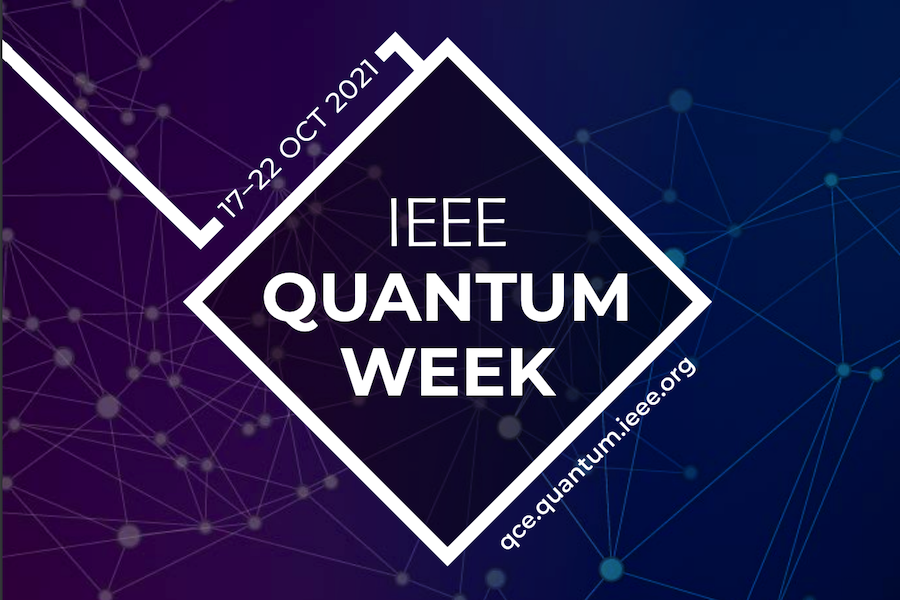EPiQC Research Receives Best Paper Award at IEEE Quantum Week

A new strategy developed by UChicago CS researchers to expand the scalability of quantum computers received a Best Paper Award at the 2021 IEEE International Conference on Quantum Computing and Engineering, also known as IEEE Quantum Week.
In the paper, “Practical implications of SFQ-based two-qubit gates,” authors Mohammad Reza Jokar, Richard Rines and Professor Frederic T. Chong describe a new system for moving classical controllers inside the dilution refrigerators that house most quantum computers. Qubits, the basic unit of quantum computation, need extremely low temperatures to operate: -273 degrees Celsius, or -460 degrees Fahrenheit. As such, the quantum components are kept inside a powerful refrigerator, controlled by outside classical controllers that operate via microwave transmission.
Moving these controllers inside the refrigerator would enable faster, more reliable, and scalable quantum computers. By combining a logic technology called Single Flux Quantum (SFQ) with two-qubit gates, the researchers designed an in-fridge classical controller that matches existing microwave systems on gate fidelity and gate time.
“The promising results of this paper show that (1) SFQ-based universal quantum computation is both feasible and effective; and (2) SFQ is a promising approach in designing classical controller for quantum machines because it can increase the scalability while preserving gate fidelity and performance,” the authors write.
The award-winning paper was one of seven by UChicago authors presented at the conference, which ran from October 17th through 22nd. Six of the seven papers came from members of the UChicago CS research group of Fred Chong and the Enabling Practical-scale Quantum Computation (EPiQC) expedition, a multi-institutional collaboration directed by Chong.
Other papers included:
Adaptive Circuit Learning for Quantum Metrology
Ziqi Ma, Pranav Gokhale, Tian-Xing Zheng, Sisi Zhou, Xiaofei Yu, Liang Jiang, Peter Maurer, Fred Chong (Univ. of Chicago)
Transferability of Optimal QAOA Parameters between Random Graphs
Alexey Galda (Univ. of Chicago), Danylo Lykov (Argonne Natl. Lab), Xiaoyuan Liu, Ilya Safro (Univ. of Delaware), Yuri Alexeev (Argonne Natl. Lab)
Adapting Quantum Approximation Optimization Algorithm (QAOA) for Unit Commitment
Samantha Koretsky (Univ. of Chicago), Pranav Gokhale (Super.tech), Jonathan Baker, Joshua Viszlai (Univ. of Chicago), Hanhao Zheng, Niroj Gurung, Ruan Burg, Aleksi Paaso (Commonwealth Edison), Amin Khodaei (Univ. of Denver), Rozhin Eskandarpour (Resilient Entanglement), Fred Chong (Univ. of Chicago)
Quantum Fan-out: Circuit Optimizations and Technology Modeling
Pranav Gokhale (Super.tech), Samantha Koretsky (Univ. of Chicago), Shilin Huang, Swarnadeep Majumder (Duke Univ.), Andrew Drucker (Univ. of Chicago), Kenneth Brown (Duke Univ.), Fred Chong (Univ. of Chicago)
Error Mitigation for Deep Quantum Optimization Circuits by Leveraging Problem Symmetries
Ruslan Shaydulin (Argonne Natl. Lab), Alexey Galda (Univ. of Chicago)
Adaptive Job and Resource Management for the Growing Quantum Cloud
Gokul Subramanian, Kaitlin Smith (Univ. of Chicago), Prakash Murali (Princeton Univ.), Fred Chong (Univ. of Chicago)













